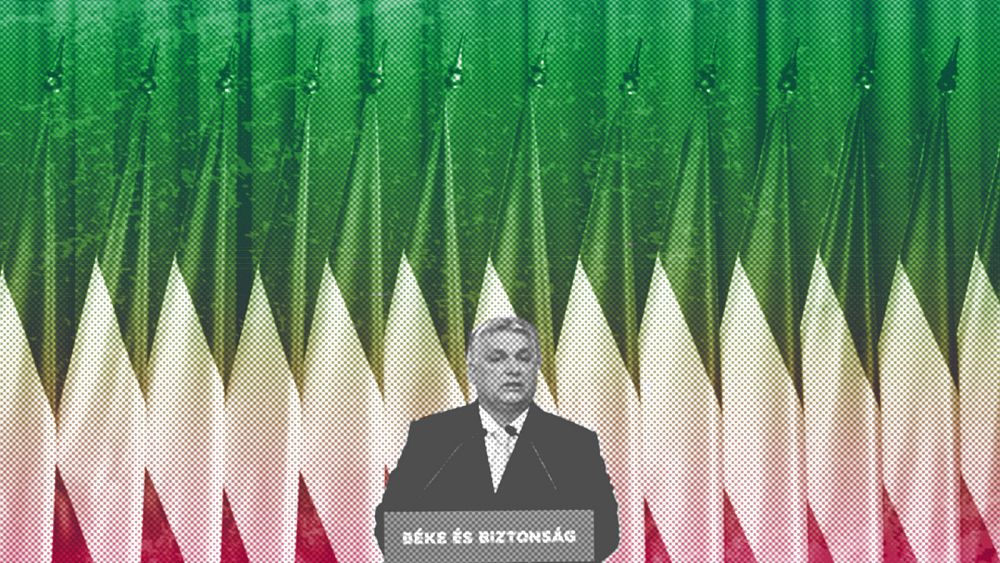Viktor Orbán has used the war in Ukraine to advance his own interests

The opinions expressed in this article are those of the author and do not represent in any way the editorial position of Euronews.
In its latest “public information” campaign, coinciding with the first anniversary of Russia’s attack on Ukraine, the government in Budapest depicted Hungary as a force for peace battling against the Western war machine.
This rhetoric — complete with continuing attacks on the “Brussels superstate” — is a classic example of the propaganda that Hungary’s Prime Minister Viktor Orbán has been peddling for years.
Orbán’s pro-Russian stance, however, remains much misunderstood. It is strategic, and aimed at weakening European support for Ukraine.
It is also relatively new and a reflection of his self-interested brand of politics and willingness to gamble to assert Hungary’s position on the international stage.
In reality, Orbán is not pro-Russian; he is simply pro-Orbán.
How and why Orbán chose not to commit
To understand how and why Orbán came to defend a “non-aligned” position in the war in Ukraine, it is worth a recap.
Back in 2008, when Russia attacked Georgia, Orbán — then in political opposition — was quick to condemn Russian aggression, stating, plainly, that “military aggression is military aggression”.
It is in the period thereafter, against a backdrop of economic uncertainty, that Orbán so-called “illiberal” experiment and his change of perspective towards eastern autocracy took hold.
Following his election win in 2010, he came to the conclusion that “Western dominance” in the world was in decline and decided that committing himself to one side would be disadvantageous.
Orbán determined that Hungary should strike out on its own and play a leading role within a new Central and Eastern European bloc, where smaller powers could assert themselves.
A rapprochement with Moscow was a key component of this “Eastern Opening”, and just two years after describing Russia as a “military aggressor”, Orbán called upon the Central European nations to create a new dialogue with Russia — marking a shift in Hungary’s two-decade-long foreign policy outlook.
Business deals came with a change in rhetoric, too
Part of this shift was underpinned by economic considerations and the influence of Russian loans.
Between 2010 and 2014, Orbán’s government nationalised the country’s energy companies, taking them out of foreign ownership before selling them again to pro-government Hungarian businesses. In other words, Orbán’s cronies.
The move allowed Orbán to control energy trade negotiations: in 2014, he secretly negotiated the construction of a nuclear power plant with Russian-state funding, as well as the South-Eastern TurkStream gas pipeline, which opened in 2021.
The country also struck a new 15-year gas deal with Russia and became home to the pro-Russian International Investment Bank.
By 2019, Hungary’s dependence on Russia was at a level not seen since 1990. This shift in the balance of power also happened to coincide with annual meetings with Russia’s President Vladimir Putin, with the last, in February 2022, described as a “peace mission”.
When Russia invaded Ukraine, Orbán was therefore presented with two choices: continue to walk a tightrope between Western and Eastern interests or stand with Europe in its support for Ukraine.
He chose the former and has spent the past year criticising the EU’s role in the war whilst calling for “peace”.
“We should stay out of this war” has become Fidesz’s campaign slogan.
Today, you cannot walk the streets of Budapest without seeing government-commissioned posters criticising the Western sanctions policy.
Orbán has harnessed the power he and his allies wield over media and messaging to smear his political opponents as “warmongers”.
Poverty at home might be his undoing
Yet, the energy crisis — which is impacting much of Europe — could, ultimately, be his undoing.
With household energy prices frozen since 2013, soaring bills have come as a shock to Hungarian voters.
Inflation is currently running at 25%, in large part due to the Government’s mismanagement of the economy.
It impoverished a significant part of society — including those within the Fidesz voting base.
Orbán’s repeated provocations of the EU have finally resulted in belated attempts to rein him in.
In late 2022, the European Commission made a €7.5-billion post-covid recovery grant conditional on Hungary achieving democratic “milestones”.
However, even with his back seemingly against the wall, Orbán has, again, managed to find a way out.
In December, he threatened to veto an €18-billion aid package to Ukraine in a rebuke to the European Commission’s behaviour.
He has, so far, successfully used Hungary’s “non-aligned” position in the war to extract funding.
Betting against Hungary’s status just to stay in power
In every crisis relating to the EU and Russia, Orbán has managed to sidestep potential landmines and advance his interests.
And as the war in Ukraine drags on, he has other opportunist cards to play.
He knows, for example, that Europe is paying a heavy price for supporting Ukraine and that some political parties on the continent are now calling for a swift resolution to the conflict.
He is also counting on dwindling support for the war and the possible election of Donald Trump as the next US president in 2024 to change the rules of the game once more.
Orbán’s record in power reveals one thing: he is a risk-taker who is willing to gamble with Hungary’s position on the international stage to stay in power.
He remains hopeful, even while adopting morally indefensible positions, that his ‘pragmatic’ support for ‘peace’ will pay off.
He won big with this strategy in the past – and if left unchecked, he could win big again.
Zsuzsanna Szelényi is a foreign policy expert, former Hungarian MP, and the author of Tainted Democracy: Viktor Orbán and the Subversion of Hungary.
At Euronews, we believe all views matter. Contact us at view@euronews.com to send pitches or submissions and be part of the conversation.
Viktor Orbán has used the war in Ukraine to advance his own interests
Source: Reporters View PH
No comments